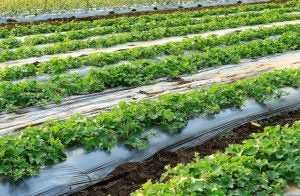It was only a couple of years ago when I started searching for my first home to purchase. It was definitely a seller’s market, as it still is today, with houses usually selling within the first 72 hours of being on the market. So when I found the one I wanted, I had to snap it up (though even that didn’t stop the eventual bidding war).
I was immediately drawn to the extensive garden tucked in the property’s backyard. It boasted a shed with a potting bench and 12 large raised beds surrounded by stoned pathways. It was a small consolation for moving away from the farm; I could still enjoy the fresh produce I was used to as well as get my hands dirty.
I moved into the house too late in the season to do much the first year. But by the second year, I dug into the garden with gusto. I grew strawberries, asparagus, tomatoes, peppers, cantaloupe, gourds, cut flowers, and pumpkins. The results were mixed. I enjoyed lots of asparagus from spring through early summer. I had a bumper crop of tomatoes. I grew the most delicious cantaloupe ever. And the pumpkins were huge (if oddly shaped). On the other hand, my dog Mischa ate my peppers before I could pick them. The gourds were a total bust. And I never had enough time to actually cut the flowers.
Overall, I loved it. It kept me busy while Mischa enjoyed the outdoors (try keeping her inside when the weather is nice), and there’s really nothing better than eating fresh produce you’ve grown yourself.
But let’s be totally clear: I was gardening, not farming.
I know the difference because my family ran a farm market for over 25 years. Almost all of the produce we sold was grown on our farm. Our year started with seeding the plants. It continued as we transplanted the small plants into the field, nurtured them as they grew, and harvested the produce when it was ready. Most was then sold at our roadside stand, with a smaller portion going to local grocery stores.

So how is farming different than gardening?
It starts at the very beginning. I bought plants and plugged them into the ground. On the farm, Mom started seeding in March. Each seed was carefully inserted into a cup of dirt. We had an older heater for the greenhouse to keep them warm on cooler nights. Sweet corn was planted in stages, so we had a steady supply throughout the summer. Tree fruits were protected from late frosts.
For my garden, I had to weed my raised beds regularly. I’d don my leather gloves and get to work. The entire process took half an hour. On the farm, it was never so easy. We usually laid down a biodegradable black plastic that both kept the soil warm and stopped the weeds. But there were still times when we spent hours on our hands and knees pulling weeds.
I didn’t really worry much about pests in the garden. Sure, the rabbit had his fill of my produce, but insects weren’t an issue. But pests are always a problem on the farm, especially for fruits and vegetables. Dad had to keep a strict schedule for spraying; even waiting a day too long could make a huge difference. I mean, people get pretty squeamish about worms in sweet corn.
Harvest in my garden was different too. Each day I grabbed my little basket and walked to the garden. I filled it up with yummies and was done in about 10 minutes. But harvest on the farm is longer, harder, and a logistics game. Just for our small cantaloupe patch, it took an hour and five people to accomplish daily. We overfilled anywhere from six to eight bulk bins each day (there’s about 200 cantaloupes to a bin). And we had to use a forklift to move those bins from the trailer into the cooler.
In other words, gardening is a fun hobby; farming is work.
Don’t get me wrong, gardens are great. They can be good for mental health. They teach kids how food is grown and raised. They’re a source of fresh fruits and vegetables, which we should all eat more of. And it’s a great way to just get outside and feel productive.
But my garden will never do the work of a farm. It will never be more than a hobby. It will never produce consistent and sufficient crops to keep me fed. “Grow food, not lawns!” might be a fun slogan, but it isn’t practical or realistic to think my raised beds can replace farms.
Gardening doesn’t make me a farmer.
Amanda Zaluckyj blogs under the name The Farmer’s Daughter USA. Her goal is to promote farmers and tackle the misinformation swirling around the U.S. food industry.


